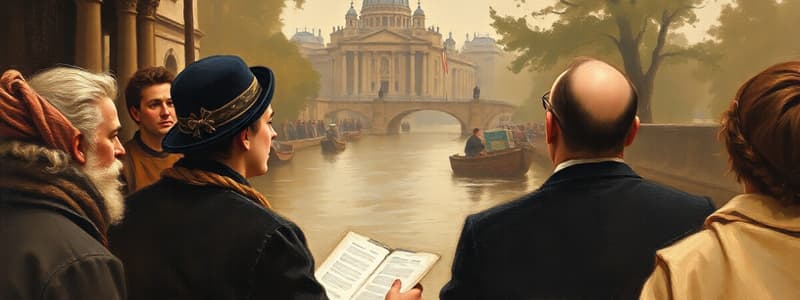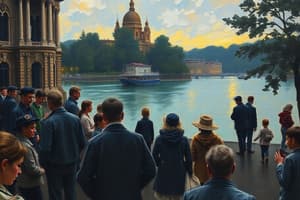Podcast
Questions and Answers
What is a common way voters make decisions in the absence of candidate information?
What is a common way voters make decisions in the absence of candidate information?
What type of cues can influence voter decisions in non-partisan elections?
What type of cues can influence voter decisions in non-partisan elections?
Why might some voters not research candidates thoroughly?
Why might some voters not research candidates thoroughly?
How do demographics impact voters' opinions?
How do demographics impact voters' opinions?
Signup and view all the answers
Which demographic group's voting preferences were highlighted in the 2020 presidential election results?
Which demographic group's voting preferences were highlighted in the 2020 presidential election results?
Signup and view all the answers
Which event caused George W. Bush's approval rating to spike to 86 percent in 2001?
Which event caused George W. Bush's approval rating to spike to 86 percent in 2001?
Signup and view all the answers
What likely happens to presidential approval ratings after significant events?
What likely happens to presidential approval ratings after significant events?
Signup and view all the answers
What was a primary reason for public frustration with the ACA's individual mandate?
What was a primary reason for public frustration with the ACA's individual mandate?
Signup and view all the answers
What significant change occurred to the individual mandate penalty after 2018?
What significant change occurred to the individual mandate penalty after 2018?
Signup and view all the answers
What trend has been observed in public opinion regarding same-sex marriage since 1996?
What trend has been observed in public opinion regarding same-sex marriage since 1996?
Signup and view all the answers
Which issue incites strong emotions related to the Second Amendment?
Which issue incites strong emotions related to the Second Amendment?
Signup and view all the answers
What trend was observed in voting behavior related to income levels?
What trend was observed in voting behavior related to income levels?
Signup and view all the answers
How did the voting percentages of women in the 2016 presidential election compare with those in 2020?
How did the voting percentages of women in the 2016 presidential election compare with those in 2020?
Signup and view all the answers
What differing opinion on gun ownership was noted between Californians and Texans?
What differing opinion on gun ownership was noted between Californians and Texans?
Signup and view all the answers
Study Notes
Public Opinion
- Americans hold diverse views on politics, policies, and institutions.
- Public opinion shifts slowly but can be influenced by events.
- Ideology can change over time, for example, a college student's views may shift after college.
- Experiences affect public opinion, including events, exposure to new information, and growing older.
- Citizens form opinions using heuristics (shortcuts) or by doing research.
- Political party membership is a common heuristic.
- Voters may base opinions on a candidate's background or endorsements.
- Demographic factors like age, gender, race and income influence opinions.
- Public opinion changes over time, reflecting different events, and political figures.
- Public opinion on same-sex marriage and immigration has changed significantly over the last 20 years.
Political Culture
- State political cultures and traditions affect ideologies and opinions.
- For example, opinions on gun rights vary significantly across states.
- The workplace influences beliefs and opinions, as people share similar experiences and associate with colleagues.
- Political elites like commentators and talk show hosts influence public opinion through their commentary on events.
Public Opinion and Institutions
- Public opinion on political institutions like Congress, the executive branch, and the Supreme Court fluctuates.
- Presidential approval ratings are often influenced by events and performance of the country.
- Congressional approval ratings often fluctuate based on events like wars, recessions, and political disputes.
- Public approval of institutions can be affected by actions and judgments made by the individual institutions.
- These fluctuations affect the way citizens perceive those institutions.
Studying That Suits You
Use AI to generate personalized quizzes and flashcards to suit your learning preferences.
Related Documents
Description
Explore the diverse views of Americans on politics, policies, and institutions. This quiz delves into how public opinion shifts over time due to experiences, demographic factors, and state-specific political cultures. Understand the influence of ideology and how events shape collective opinions.




